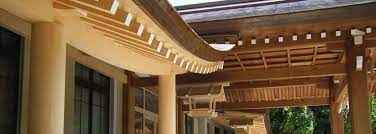Nestled alongside the coast and widespread west of the coastal mountains of British Columbia (B.C.), Canada, prospers an outstanding species known as Yellow Cedar. This specific tree, renowned for its resilience and sturdiness, stands as a testament to nature’s craftsmanship, requiring over a century to gain a marketable size. With a statue reaching up to 24 meters tall and 90 centimeters in diameter while mature, Yellow Cedar graces the panorama with its rarity and splendor.
Yellow Cedar Wood, scientifically called Callitropsis nootkatensis or Cupressus nootkatensis, belongs to the cypress’s own family, the Cupressaceae. It is a medium-sized tree that often grows singly or in small clumps in combination with different conifers. While its growth rate is gradual, yellow cedar compensates with its remarkable durability and power, making it a prized commodity within the realm of woodworking.
What are the benefits:
- Exceptional Durability: Yellow cedar is famous for its top-notch sturdiness and solidity, making it exceedingly resistant to wear, tear, and rot.
- Versatile Applications: Renowned for its ease of workability, yellow cedar reveals desire in a myriad of packages, along with joinery, carpentry, decorative paneling, and fixture crafting.
- Natural Resistance: With a natural resistance to termites and decay, yellow cedar proves its mettle in out-of-doors environments, enduring the take a look at time with unwavering fortitude.
- Aesthetic Appeal: Yellow cedar boasts a fine and uniform texture, lending itself beautifully to complex carvings and improving the visual enchantment of any project.
- Longevity: As one of the world’s longest-lasting woods, yellow cedar offers fantastic durability, ensuring the durability of structures and furniture.
- Environmental Impact: Harvested responsibly, yellow cedar gives a sustainable desire to conscientious customers, minimizing waste and environmental effects.
- Ease of Workability: Yellow cedar’s high-quality running holmes make it a favorite among craftsmen, enabling unique shaping and seamless integration into numerous tasks
Common Applications of Yellow Cedar
Yellow Cedar’s appeal lies now not only in its aesthetic attraction but also in its exquisite versatility. Esteemed for its ease of workability, this timber reveals its manner in an array of programs.
From joinery and carpentry to decorative paneling and furnishings, Yellow Cedar lends its electricity and durability to numerous initiatives. Its resilience makes it an ideal choice for shingles, marine pilings, small boat hulls, and outside door and window packing containers.
Furthermore, structural grades of yellow cedar are regularly utilized in exterior construction, which includes bridges, decking stairs, and landscaping endeavors. Even in distinctive tasks like temples and shrines, Yellow Cedar leaves its mark with difference.
Working Properties of Yellow Cedar
One of the most excellent attributes of Yellow Cedar is its high-quality running homes. This wood is a craftsman’s dream; it is effortlessly machined, finished, and shaped to precision.
Whether turning, planing, or shaping, Yellow Cedar responds with grace, allowing artisans to reap a smooth and wonderful end. Its nice texture makes it a preferred choice for complex carvings, and at the same time, its sturdiness ensures toughness in each utility. From door frames in India to roof decking and beyond, Yellow Cedar continues to demonstrate its adaptability and resilience across the globe.
Technical Specifications for Yellow Cedar
For those willing in the direction of technical information, Yellow Cedar boasts extraordinary stiffness, energy, and density metrics, making it a powerful contender inside the global woodworking industry.
With a herbal resistance to termites and decay, Yellow Cedar proves its mettle in out-of-doors environments, enduring the test of time with unwavering fortitude. Whether staining, painting, or actually embracing its herbal finish, yellow cedar stands as a testament to nature’s ingenuity and craftsmanship.
Comparative Analysis with Other Woods
Yellow cedar’s specific traits set it apart from other wood species, making it a favored choice for discerning craftsmen and developers. Compared to other kinds of cedar, such as Western Red Cedar or Eastern Red Cedar, yellow cedar has advanced sturdiness and durability, making it appropriate for a wide range of applications. Its nice texture and ease of workability make it a versatile option for both indoor and outdoor tasks, even as its herbal resistance to decay guarantees toughness even in harsh environments.
Sustainability and Environmental Impact
In an age where sustainability is paramount, Yellow Cedar Wood sticks out as a responsible preference for conscientious purchasers. With the right forest management practices in place, yellow cedar harvesting can be performed in a sustainable manner, ensuring the preservation of this treasured and useful resource for future generations. Furthermore, yellow cedar’s longevity and durability reduce the need for frequent replacements, thereby minimizing waste and environmental impact.
Conclusion
Yellow cedar is more than just a kind of wood—it is a symbol of resilience, versatility, and timeless beauty. From its humble origins along the coast of British Columbia to its large programs across the globe, weathered yellow cedar continues to captivate and inspire with its enduring attraction. So, the next time you embark on a woodworking mission or admire a fantastically crafted piece of furniture, keep in mind the superb journey of Yellow Cedar and the limitless opportunities it holds inside its robust embrace.
Whether used in structural packages or ornamental accents, yellow cedar stands as a testament to nature’s ingenuity and the iconic legacy of workmanship.


